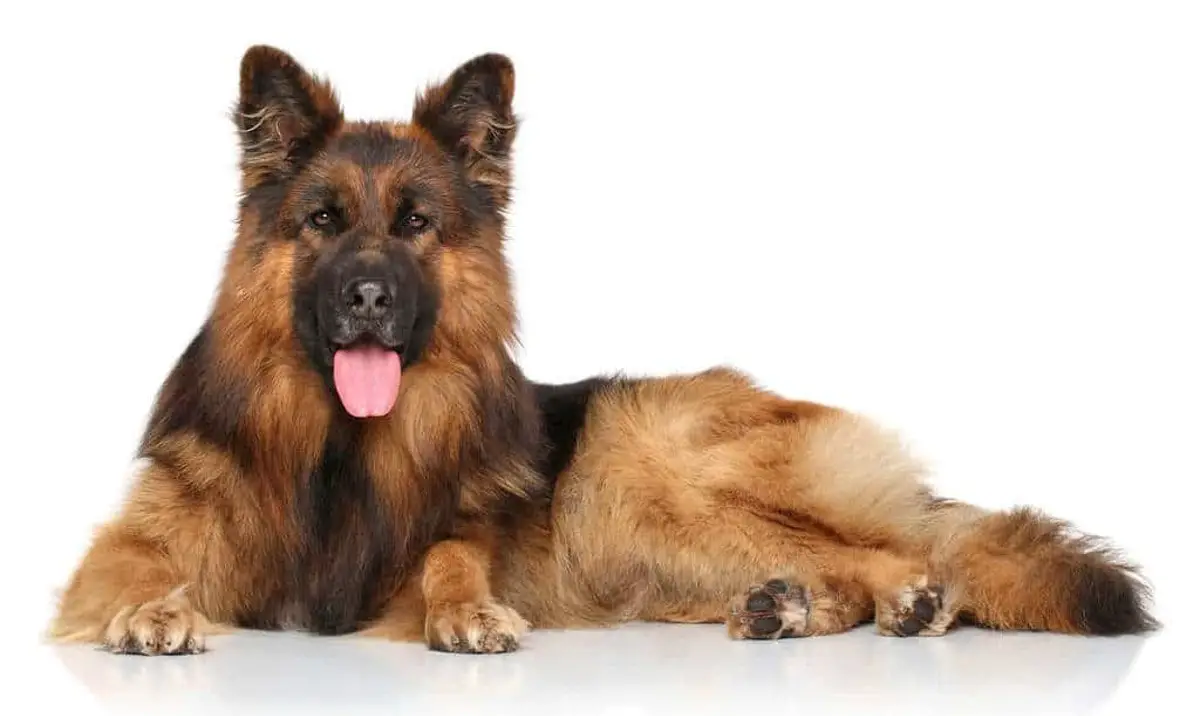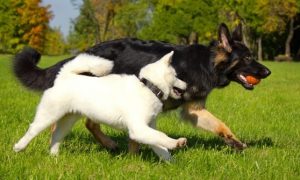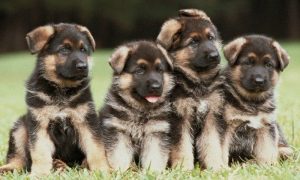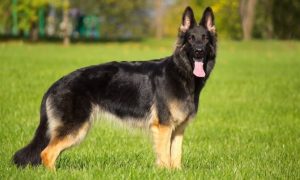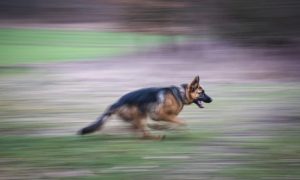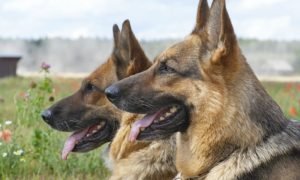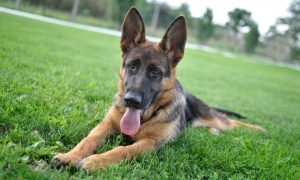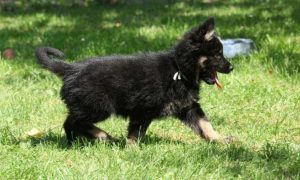King Shepherd Versus German Shepherd
The King Shepherd is a herding breed that falls into the classification of a large German Shepherd.
They are mainly the result of crossbreeding a Shiloh Shepherd and a German Shepherd Dog.
The Shiloh Shepherd is a crossbreed of the German Shepherd, Alaskan Malamute, and Canadian White Shepherd.
Being a mixed breed, King Shepherds are not recognized by the American Kennel Club.
The King Shepherd is an extra-large Shepherd hybrid and a lot of dog.
Below are 12 things you should keep in mind and consider before getting a King Shepherd.
1. What is the Origin of the King Shepherd?
Americans Shelley Watts-Cross and David Turkheimer created King Shepherds.
The King Shepherd was initially bred in the early 1990s from German and European Shepherds with Alaskan Malamutes and Great Pyrenees.
The goal of the King Shepherd is a larger and healthier dog with the same qualities and stunning look as the German Shepherd.
In 1995, The American King Shepherd Club (AKSC) was officially founded and defined the breeding of an F1 Generation King Shepherd:
- Breeding a German Shepherd to a Shiloh Shepherd
- Breeding a King Shepherd to a German Shepherd
- Breeding a King Shepherd to a Shiloh Shepherd
Eventually, the AKSC expanded its King Shepherd breed standard. They introduced different breeds that rely on the King Shepherd’s unique characteristics, which differ from the German Shepherd.
Per the AKSC, a King Shepherd is a German Shepherd that can be mixed with the Shiloh Shepherd, Alaskan Malamutes, Belgian Shepherd Great Pyrenees, Leonberger, and Akita.
2. Size Difference Between a King Shepherd and a German Shepherd?
King Shepherds are extra-large and have a larger frame compared to regular German Shepherds.
Male King Shepherds stand at 27-31 inches (68-79 cm), compared to the German Shepherd, who stands 23-26 inches (55 to 65 cm) at the withers.
Female King Shepherds stand around 27 inches (68 cm), compared to standard females standing at 21 to 24 inches (55 to 60 cm) at the withers.
Male King Shepherds weigh around 130-150 pounds (59 to 68 kg), while standard male German Shepherds weigh between 85 to 100 pounds (36 to 45 kg).
Female King Shepherds weigh about 90 to 110 pounds (40 to 49 kg), while standard female German Shepherds weigh around 60 to 80 pounds (27 to 37 kg).
3. King Shepherd Appearance
At first glance, many mistake the King Shepherd for a large, long-haired German Shepherd.
The King Shepherd is bred to be extra-large and keep the appearance of a German Shepherd.
Appearance Similarities of the King Shepherd and German Shepherd
- Strong and muscular bodies with broad chests.
- Heads are large with strong jaws and teeth
- Nose and lips have black pigmentation
- Oval-shaped eyes of dark brown color
- Ears are high on the head and triangular in shape
- Tails hang straight down with a slight curve
Hip angulation is a difference between a King Shepherd and a German Shepherd.
American breed German Shepherds have severe hip angulation, which causes their backs to look sloped.
King Shepherds have a balanced hip angulation which gives them a straight or flat back.
A King Shepherd puppy is easy to recognize because of its plush coat, teddy bear face, and thick ears.
4. King Shepherd Colors
German Shepherds have 13 recognized coat colors.
King Shepherds have less variety when it comes to colors.
Desirable King Shepherd coat colors according to breed standards of the AKSC are:
- Black and tan
- Black and red
- Black and gold
- Black and cream
- Sable
- Bi-colored
- Solid black
The most significant distinction between a King Shepherd and a German Shepherd (besides size) is the coat.
A German Shepherd’s coat can be short, medium, long, and double-coated.
A King Shepherd’s coat will always be medium or long and double-coated with thicker and longer fur around the neck.
5. The King Shepherd’s Temperament
The King Shepherd has the same temperament and qualities that make the German Shepherd Dog so popular.
King Shepherds are loyal, courageous, intelligent, protective, affectionate, and energetic.
King Shepherds are bred intentionally to have sound temperament yet not be as aggressive as the German Shepherd Dog.
King Shepherds may be less intense in their demeanor than their German Shepherd relatives but still have protective instincts combined with their intimidating size to keep their loved ones safe.
A King Shepherd’s imposing presence and their aloofness towards strangers give some people the impression of a dangerous and aggressive dog. However, owners lovingly refer to their King Shepherds as gentle giants.
With proper socialization from a young age, King Shepherds do well with children and other pets making them an ideal family dog.
6. Training a King Shepherd
King Shepherds are similar to German Shepherds when it comes to training,
The King Shepherd is intelligent, which makes them easy to train. They are eager to please their owners and quick to learn new things.
Training and socialization should start as soon as you bring your King Shepherd puppy home.
However, smart breeds need lots of mental stimulation to remain happy and well-behaved. A King Shepherd will thrive as an included member of your family with simple jobs such as going with you to get the mail or watching over kids playing in the yard.
A King Shepherd left alone for extended periods will become bored, destructive and may develop separation anxiety.
7. Caring for a King Shepherd
The care required for a King Shepherd is the same as a regular German Shepherd.
The King Shepherd is classified as a working breed with herding instincts genetically built-in. They have a lot of energy and need a lot of daily exercise to keep them physically stimulated and happy.
King Shepherds are best suited for active owners, require lots of attention and play, and plenty of yard or trips to the park to thrive.
The King Shepherd’s coat is thick, dense, and water-resistant. To avoid stripping the natural oils from the skin, the King Shepherd only requires bathing 3 to 4 times per year or as needed.
The King Shepherd doesn’t require a fancy grooming cut and wash, but they are heavy shedders due to their double coats.
All varieties of the German Shepherd Dog shed, a lot. They shed year-round and go into shed overdrive in the Fall and Spring when they blow their coat for the new season.
Brushing daily will help keep your Shepherd’s coat healthy and reduce hair tumbleweeds from overtaking your house.
The FURminator is a de-shedding brush that’s highly recommended for breeds prone to shedding.
Lastly, it’s important to remember that large breed dogs cost more money to maintain and care for.
More food is required to feed a larger dog. Bigger dog beds or dog crates cost more money. Medicine like heartworm, flea prevention, or antibiotics is prescribed by weight. The more your dog weighs, the more the meds cost.
8. What Should You Feed a King Shepherd
The King Shepherd needs quality food designed for large breeds to meet their nutritional and energy needs.
The number one ingredient for large breed dogs is protein to maintain healthy bones and muscles.
Commercial dry food is popular among dog owners, but other choices exist, such as raw, fresh, organic, etc.
Your dog’s diet plan and food are a personal choice and may take some trial and error before finding the best fit for your dog.
Learn more about diet, nutrition, and recommended dog food brands by clicking here.
9. King Shepherd Health Issues
One of the goals in creating the King Shepherd was to decrease known health issues that plague the German Shepherd Dog.
Through responsible breeding, many health issues can be eliminated or reduced, but that doesn’t mean the King Shepherd is immune from common problems among German Shepherds or large dogs in general.
Potential King Shepherd health issues to be aware of are:
- Joint Dysplasia – Hip and Elbow
- Degenerative Myelopathy
- Von Willebrand’s disease
- Bloat
- Osteoarthritis
- Allergies
10. King Shepherd Life Expectancy
Due to their large size, the King Shepherd’s life expectancy is 10 to 11 years compared to a German Shepherd’s life expectancy of 12 to 15 years.
11. How Much Are King Shepherd Puppies
A King Shepherd puppy will cost you less than a standard German Shepherd Puppy from a reputable breeder.
The lower price tag is because the King Shepherd breed is still considered new in the dog world and not as popular or mainstream as the German Shepherd.
The average price of a King Shepherd puppy is between $1,000 to $3,000.
The price will vary depending on the breeder’s reputation, the lineage of the puppy, and health guarantees.
12. Finding a King Shepherd
The King Shepherd is considered a rare breed; therefore, they are harder to find. If you are hoping to adopt or rescue a King Shepherd, you might be waiting a while.
If you are serious about getting a King Shepherd, you need to do some online research to locate a breeder.
Reputable breeders will have websites, online pictures, contracts, health guarantees, and happy customers.
The King Shepherd dates back to the 1990’s so a seasoned breeder, versus a new one, will have had many litters and will be able to predict the health and temperament of your King Shepherd puppy.
Learn how to distinguish a good breeder from a bad one by clicking here.
Final Thoughts
King Shepherds are very appealing because of their high level of intelligence, stunning looks, and loyalty.
If you love the looks and qualities of a German Shepherd but want to go bigger, a King Shepherd may be the perfect fit.
🐾🐾🐾🐾🐾
Commission Disclosure – Articles on German Shepherd Country are for education or entertainment purposes. We hope you find the information helpful! We may earn commissions, at no extra cost to you, if you shop through links on this page.

